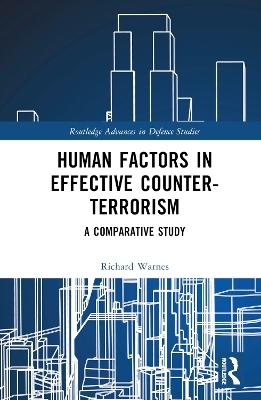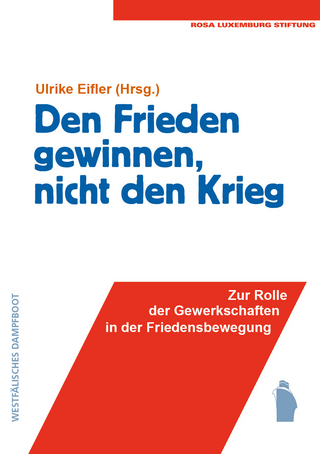
Human Factors in Effective Counter-Terrorism
A Comparative Study
Seiten
2024
Routledge (Verlag)
978-1-032-45159-6 (ISBN)
Routledge (Verlag)
978-1-032-45159-6 (ISBN)
This book provides a comparative assessment of the significance of ‘human factors’ in effective counter-terrorism.
This book seeks to provide a comparative assessment of the significance of ‘human factors’ in effective counter-terrorism.
The phrase ‘human factors’ is used to describe personal relationships, individual capabilities, effective leadership, technical interface, organisational culture and the community engagement necessary to effectively minimise, counter and control the threat of terrorism. Unlike many works in the field, this book is constructed around the input of ‘experienced knowledge’ from over 170 semi-structured interviews of specialist military, policing, intelligence and security practitioners - those actors actually involved in countering terrorism. These practitioners come from seven countries – the United Kingdom, Ireland, France, Spain, Israel, Turkey and the United States – all of which have suffered over the years from different types of terrorist threat and responded with a mixture of counter-terrorist measures. Where military practitioners also discussed overseas counter-insurgency measures, that material has been included, since terrorism forms a key aspect of such wider insurgencies. The resulting interview data was analysed through a variant of ‘Grounded Theory’ to identify key emerging themes and issues, both positive and negative, relevant to ‘human factors’ in the individual countries and more generically. This book incorporates the informed operational experiences and insights of the interviewees while seeking to provide examples of successful counter-terrorist measures at the strategic, operational and tactical levels.
This book will be of much interest to students of counter-terrorism, defence studies and security studies in general.
This book seeks to provide a comparative assessment of the significance of ‘human factors’ in effective counter-terrorism.
The phrase ‘human factors’ is used to describe personal relationships, individual capabilities, effective leadership, technical interface, organisational culture and the community engagement necessary to effectively minimise, counter and control the threat of terrorism. Unlike many works in the field, this book is constructed around the input of ‘experienced knowledge’ from over 170 semi-structured interviews of specialist military, policing, intelligence and security practitioners - those actors actually involved in countering terrorism. These practitioners come from seven countries – the United Kingdom, Ireland, France, Spain, Israel, Turkey and the United States – all of which have suffered over the years from different types of terrorist threat and responded with a mixture of counter-terrorist measures. Where military practitioners also discussed overseas counter-insurgency measures, that material has been included, since terrorism forms a key aspect of such wider insurgencies. The resulting interview data was analysed through a variant of ‘Grounded Theory’ to identify key emerging themes and issues, both positive and negative, relevant to ‘human factors’ in the individual countries and more generically. This book incorporates the informed operational experiences and insights of the interviewees while seeking to provide examples of successful counter-terrorist measures at the strategic, operational and tactical levels.
This book will be of much interest to students of counter-terrorism, defence studies and security studies in general.
Richard Warnes is a consultant and specialist on terrorism and irregular warfare, writing and lecturing on both for the UK Ministry of Defence, NATO and the EU.
Introduction 2. Terrorist Threat & Counter-terrorist Response 3. Personal Relationships 4. Individual Capabilities 5. Effective Leadership 6. Technical Interface 7. Organisational Culture 8. Community Engagement 9. Conclusion Annex A
| Erscheinungsdatum | 02.03.2024 |
|---|---|
| Reihe/Serie | Routledge Advances in Defence Studies |
| Zusatzinfo | 23 Tables, black and white; 2 Line drawings, black and white; 2 Illustrations, black and white |
| Verlagsort | London |
| Sprache | englisch |
| Maße | 156 x 234 mm |
| Gewicht | 810 g |
| Themenwelt | Sozialwissenschaften ► Politik / Verwaltung |
| ISBN-10 | 1-032-45159-9 / 1032451599 |
| ISBN-13 | 978-1-032-45159-6 / 9781032451596 |
| Zustand | Neuware |
| Haben Sie eine Frage zum Produkt? |
Mehr entdecken
aus dem Bereich
aus dem Bereich
die Weltmacht im Hintergrund
Buch | Softcover (2022)
Klarsicht Verlag
CHF 30,80
zur Rolle der Gewerkschaften in der Friedensbewegung
Buch (2024)
Westfälisches Dampfboot (Verlag)
CHF 27,95
Kompaktwissen für Studium und Praxis
Buch | Softcover (2024)
Springer Fachmedien Wiesbaden GmbH (Verlag)
CHF 41,95


